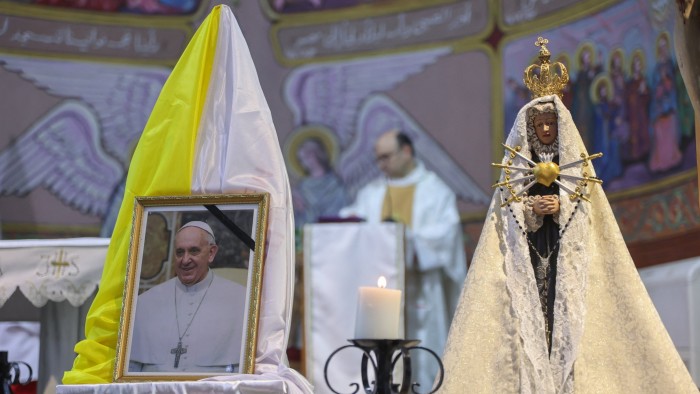Unlock the Editor’s Digest for free
Roula Khalaf, Editor of the FT, selects her favourite stories in this weekly newsletter.
Pope Francis, who died on Monday, once compared reforming Rome to cleaning the Sphinx of Egypt with a toothbrush. For someone possessed of papal infallibility, that’s a frank admission that the power of supposedly divinely endorsed leaders has limits. It’s something the leaders of big corporations sometimes struggle to grasp.
True, being head of the Catholic Church isn’t quite the role it once was. At the turn of the 13th century, Pope Innocent III was regarded as the most important person in Europe. Still, even Francis enjoyed an eager audience of about 1.4bn people, rather more than the constituencies of European Commission head Ursula von der Leyen and Italian premier Giorgia Meloni, for example.
Yet for all that, Pope Francis could only push his clout so far. He was in many ways a reformer, cleaning up Vatican finances somewhat and softening some of the church’s more conservative positions on gender. But his ability to change his organisation — and the wider world — met with limits. For all his calls for a more compassionate financial sector, US companies are now, following Donald Trump’s re-election as president, rushing to tear up pledges to close wealth gaps and right social wrongs.
Company leaders have more practical power than Francis’s successor will inherit — and acknowledge few limitations on it. Alphabet’s Sundar Pichai, or Meta Platforms’ Mark Zuckerberg, can count on followings that are a multiple of that of the Catholic church. Facebook’s apps claim 3bn users. Google’s search engine might reach twice as many again.
And in a sign of their sway over boards and shareholders, corporate bosses have never been better remunerated. JPMorgan’s Jamie Dimon and Goldman Sachs’ David Solomon both received $39mn for their labours last year. Blackstone boss Steve Schwarzman received an unearthly $1bn. Global donations from the faithful to support Francis’s works, known as Peter’s Pence, raised about $55mn in 2023. That is more than most Wall Street bosses receive, but the gap is closing.
For all their power, business chiefs still quest for more. Zuckerberg typifies those who hold super-voting shares that confer a version of infallibility. Dimon and Solomon, like almost half of the leaders of S&P 500 companies, combine CEO and chair roles, and their employers resist separating those powers.
Still, there are two vital things popes understand, and perhaps better than corporate pontiffs. First, that their power depends on others — in Francis’s case, the billion or so followers of the Catholic faith. Second, that the institution must outlive the individual. That seems obvious to a 2,000-year-old church. For high-flying companies, many just beginning their first century, it is a lesson worth remembering.
